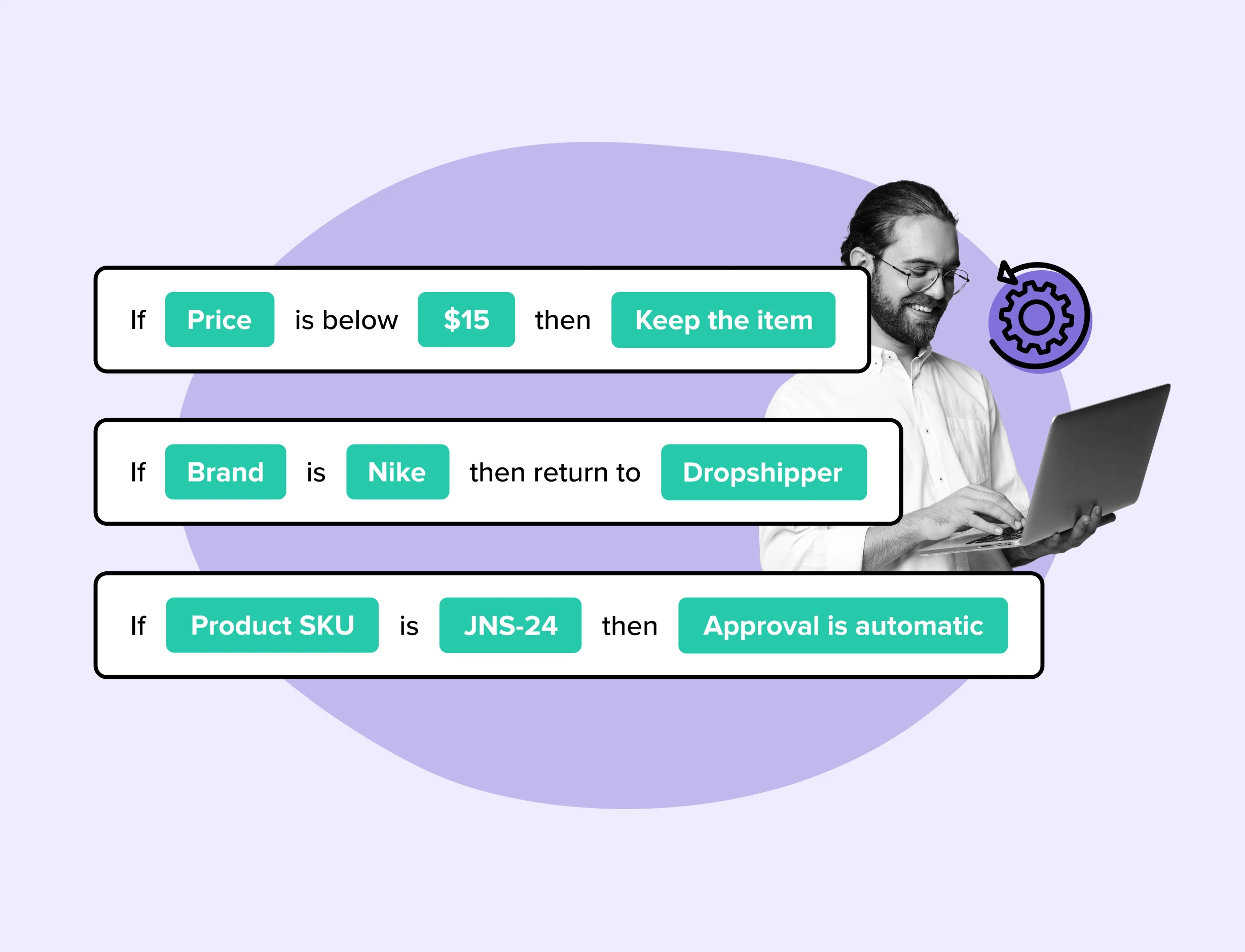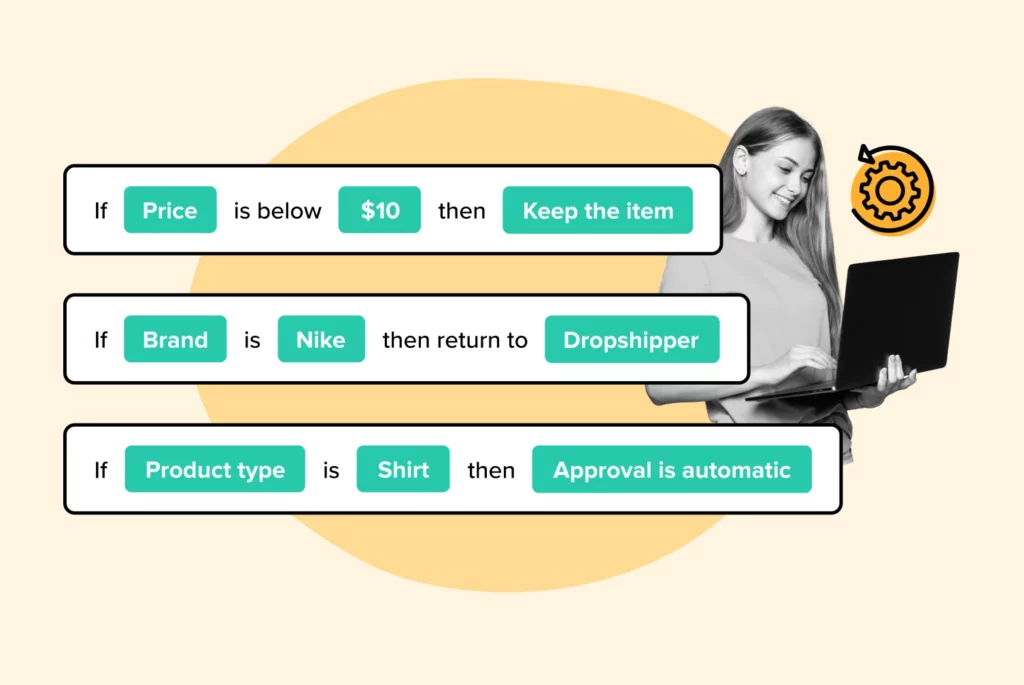
Harnessing RMA Automation for Streamlined Operations and Enhanced Growth
Discover how Return Merchandise Authorization (RMA) automation has led to improved efficiency, customer experience, and overall growth.
Shipping, Tracking & Notifications
Boost customer experience and reduce support tickets
Realtime order and shipment tracking
Proactive order and shipping notifications
AI-Enhanced Discounted Labels
Predictive pre-purchase estimated delivery dates
Self-Serivce branded order tracking
Effortless experience delivered
Identify and Resolve Order Issues
Realtime order and shipment tracking
Make returns profitable and delight customers
Flexibility to define any return destinations & conditions
Simplify returns for your customers and team
Incentivize exchanges over returns
Returns management made easy for your team
Returns management made easy for your team
Easy claims and smart upsells
Understand why your customers are returning
In-Store & Curbside Pickup
Unify the online and the in-store experience
Hassle-free pickup experience for customers
In-Store dashboard to keep operations streamlined
In-Store and Online orders unified
Drive foot-traffic to your stores
Shipping, Tracking & Notifications
Boost customer experience and reduce support tickets
Realtime order and shipment tracking
Proactive order and shipping notifications
AI-Enhanced Discounted Labels
Predictive pre-purchase estimated delivery dates
Self-Serivce branded order tracking
Effortless experience delivered
Identify and Resolve Order Issues
Realtime order and shipment tracking
Make returns profitable and delight customers
Flexibility to define any return destinations & conditions
Simplify returns for your customers and team
Incentivize exchanges over returns
Returns management made easy for your team
Returns management made easy for your team
Understand why your customers are returning
In-Store & Curbside Pickup
Unify the online and the in-store experience
Hassle-free pickup experience for customers
In-Store Dashboard to keep operations streamlined
In-Store and Online orders unified
Drive foot-traffic to your stores
Boost customer experience and reduce support tickets
Realtime order and shipment tracking
Proactive order and shipping notifications
AI-Enhanced Discounted Labels
Predictive pre-purchase estimated delivery dates
Self-Serivce branded order tracking
Effortless experience delivered
Make returns profitable and delight customers
Flexibility to define any return destinations & conditions
Simplify returns for your customers and team
Incentivize exchanges over returns
Returns management made easy for your team
Equip your team for precise return checks.
Easy claims and smart upsells
Understand why your customers are returning
Unify the online and the in-store experience
Hassle-free pickup experience for customers
In-Store Dashboard to keep operations streamlined
In-Store and Online orders unified
Drive foot-traffic to your stores
Find the answer to all your questions
Take a step by step trip through our functionality to see how we can improve your ecommerce processes.
Explore the most comon questions about WeSupply
Calculate the ROI that WeSupply can bring you
Read actionable articles on how to optimize your post-purchase experience and decrease support tickets
Get inspired by stories of how our customers implemented an effortless post-purchase experience
Wondering if WeSupply is a good fit for you? Read through our use cases to see how we can help you increase conversion & improve CX!
A Deep Dive into Top Companies' Order Tracking & Returns Strategy
Find the answer to all your questions
Explore the most comon questions about WeSupply
Calculate the ROI that WeSupply can bring you
Request a no strings attached review of your current shopping experience and missed conversion opportunities
Take a step by step trip through our functionality to see how we can improve your ecommerce processes.
Read actionable articles on how to optimize your post-purchase experience and decrease support tickets
Get inspired by stories of how our customers implemented an effortless post-purchase experience
A Deep Dive into Top Companies' Order Tracking & Returns Strategy
Wondering if WeSupply is a good fit for you? Read through our use cases to see how we can help you increase conversion & improve CX!

In today’s competitive e-commerce landscape, businesses are constantly seeking ways to optimize efficiency and enhance customer satisfaction. One key area of focus is the returns process, often considered a pain point for both customers and businesses alike. Return automation rules have emerged as a powerful solution to streamline returns, reduce costs, and ultimately improve the overall shopping experience. In this blog post, we will delve into the world of return automation rules, discussing their transformative power, types, advantages, and best practices for implementation.
Return automation rules provide businesses with increased efficiency, customer satisfaction and cost savings.
Automation can reduce manual tasks, improve speed and lead to cost savings in order to enhance operational efficiency.
Continuous improvement of the returns process is essential for businesses to stay competitive and maximize success.
WeSupply’s automated return system streamlines e-commerce by enabling easy customer returns, boosting operational efficiency, and reducing fraud, paving the way for a more effective, customer-focused online retail environment.
The significance of return automation in e-commerce is profound, contributing to efficiency, customer satisfaction, and reduced return shipping costs. Streamlining the returns process and reducing manual tasks leads to quicker return times, cost savings, and an optimized supply chain.
Services like WeSupply help streamline returns through return automation rules, allowing for automatically authorized returns based on predefined criteria.
Return automation has gained popularity in recent years, reshaping how e-commerce stores manage returns by enhancing speed, efficiency, and accuracy. Automation minimizes human error, guarantees precise shipments, reduces returns, and optimizes the refund process.
As a result, return automation has become a major influence on the e-commerce landscape, optimizing the returns process, lowering costs, increasing efficiency, and enhancing the customer experience.
WeSupply is revolutionizing the e-commerce landscape with its cutting-edge returns automation system, enhancing efficiency, customer satisfaction, and revenue in the modern returns process.
The objective of return automation is to optimize efficiency and customer satisfaction. Implementing return automation rules allows businesses to streamline the return process, enhancing its efficiency and improving customer experiences.
Automating returns processes helps enhance efficiency, decrease expenses, and heighten customer satisfaction. Companies like Evereve have observed remarkable enhancements in their returns process, including enhanced operational efficiency and a smooth experience for customers.
Return automation rules enable the automation of tedious and time-consuming tasks in the returns process, providing the ability to substitute manual tasks with automated return processes, thereby improving efficiency while saving time. By integrating return automation rules with e-commerce platforms, businesses can streamline and automate the return process, ensuring a positive customer experience by providing real-time updates and improving customer retention.
Return automation in e-commerce is the strategic implementation of technology to automate various aspects of the returns process, including the utilization of automation tools and systems to streamline and optimize the handling of product returns, making the process faster, more efficient, and more accurate. By automating the return process, businesses can benefit from time savings, improved customer satisfaction, and increased retention rates.
Return automation encompasses several fundamental concepts, such as operational efficiency, customer satisfaction, profitability, and trigger-based automation.
Return automation rules integrate with e-commerce platforms through the use of customized refund and exchange rules, automated capturing of key information on each return, integration with shipping and fulfillment systems, automation of notifications and data capture, and streamlined returns policies. Platforms like Shopify, WooCommerce, and Magento offer businesses the ability to streamline and automate the return process, with features like self-serve returns, centralized returns management, automation based on order data, automatic approval or flagging for review, and integration with order management.
Return automation rules in e-commerce have had a revolutionary effect on returns management. They allow businesses to automate actions within the returns process based on predefined criteria, such as:
Item validation
RMA approval
Shipment in transit
Shipment receipt
This includes automated tracking and pattern identification, self-service portals and in-store kiosks for returns, and time-saving for employees. These automation rules have streamlined processes, reduced costs, and enhanced customer satisfaction.
Automation has significantly transformed returns management in e-commerce, making it faster, more efficient, and more accurate. By leveraging technology and automated processes, returns automation can streamline the management of returns, reduce costs, and foster customer trust.
Automation has the potential to revolutionize the way e-commerce stores handle returns. It can:
Improve operational efficiency
Enhance customer satisfaction
Reduce errors
Speed up turnaround times
WeSupply revolutionizes the return process with automated solutions that streamline operations, minimize fraud, and cut down on human error, ensuring a swift, self-service return experience that builds customer trust and loyalty.
Effective returns management is vital for e-commerce businesses as it maintains customer loyalty and trust. Prompt handling of incorrect or damaged products improves the overall customer experience. Automating the returns process enables businesses to swiftly process and restock returned products, reducing costs and enhancing efficiency.
A streamlined return process in e-commerce businesses can significantly improve customer satisfaction, reduce costs, and optimize operational efficiency.
With WeSupply, enhance your returns oversight and inventory management through meticulous inspections and restocking protocols. Implement robust quality control by utilizing customer feedback and images, while empowering your warehouse team with a system to annotate inspection details. Plus, streamline your process with our policy enforcer, which automatically approves, rejects, or flags returns and exchanges based on your predefined criteria, keeping your operations efficient and consistent.
Experience the precision of WeSupply’s returns management firsthand—Book a demo to see how our system can refine your quality control and automate your returns policy, ensuring your inventory management is as efficient and reliable as possible.
Simplify returns for your customers and support team
Book a quick call with our experts to see how WeSupply can help you make returns easy for your customers with a beautiful, self-service solution that makes their experience easier while also providing new ways to lower costs and earn back revenue.
Return automation rules can be categorized into four main types, including the auto refund rule:
Auto-Refund
Auto-Exchange
Auto-Approve
Auto-Mark as Done
These rules enable businesses to automate various aspects of the returns process, allowing for a more efficient and streamlined approach to handling customer returns, minimizing manual tasks, and augmenting process speed.
Auto-Refund is a process that can automatically approve refunds for customers based on pre-determined criteria, such as:
item validation
RMA approval
shipment in transit
shipment receipt
This integral part of returns management in e-commerce helps to optimize the refund process, including determining the refund amount and offering store credit, to enhance customer satisfaction.
Auto-Exchange is a process of automated product exchanges in e-commerce that utilizes technology to simplify and quicken the exchange process. This includes the following steps:
Customer initiation
Automated exchange request generation
Inventory check
Exchange approval
Return shipping
Product inspection
Exchange fulfillment
Notification
Auto-Approve in return automation signifies the automated acceptance of return requests based on predefined criteria, thereby eliminating the necessity of manual review and expediting the return acceptance process. By incorporating a return request into this system, it allows for an efficient processing of returns without the need for manual intervention.
Auto-Mark as Done in return automation indicates an automation rule that automatically marks the status of a return merchandise authorization (RMA) as ‘Done’ upon completion of all necessary steps for the return. This automation facilitates the process of finalizing the status of returns without manual involvement.
Implementing return automation rules can provide e-commerce businesses with numerous advantages, including:
Increased operational efficiency
Improved customer satisfaction
Cost reductions
Positive effect on workforce efficiency
Overall bottom line improvements
These benefits can be observed through various aspects of the returns process, from reducing manual tasks to improving the speed and accuracy of returns processing.
By implementing return automation rules, businesses can facilitate the return process and make it more efficient. This contributes to enhanced operational efficiency by reducing manual tasks involved in the returns process, improving process speed, and ultimately leading to cost savings.
Shortening return times in e-commerce has a positive effect on customer satisfaction by decreasing the turnaround time for refunds or exchanges. This expedited resolution of returns builds customer faith and commitment, as they feel their issues are being addressed promptly and effectively.
This helps to maintain a positive relationship with customers by providing a seamless and efficient returns experience, thus improving customer satisfaction with the e-commerce platform.
WeSupply boosts customer satisfaction by using CSAT and NPS to gain insights and foster loyalty. Emphasizing data-driven improvement, it offers tools to measure and refine customer service. This approach helps pinpoint and resolve issues effectively, ensuring a better shopping experience.
Return automation rules can result in cost savings for e-commerce businesses by reducing the costs of reverse logistics, processing returns, and labor costs. For instance, one case study showed that automation enabled a company to save nearly $1 million dollars a year in labor costs. Automation can also help businesses save on shipping fees and restocking expenses associated with processing returns, leading to cost savings and improved profitability.
Just like in the case of Evereve, a contemporary women’s fashion store. WeSupply’s automation tools transformed EVEREVE’s returns into a strategic advantage, reducing RMA costs and streamlining operations. By automating and integrating their return system, EVEREVE minimized manual tasks and improved data visibility, leading to faster return processing, fewer markdowns, and enhanced team productivity. This strategic overhaul resulted in significant cost savings and bolstered customer satisfaction through a seamless, self-managed return experience.
Discover the true value of seamless returns for your business with WeSupply’s ROI Calculator – where every click could mean a cut in costs and a rise in customer satisfaction. Start calculating now and turn your returns into returns on investment!
Implementing return automation rules can have a beneficial effect on workforce efficiency in e-commerce. By automating the returns process, businesses can optimize the utilization of workforce resources, eliminate bottlenecks and complexity, and decrease staffing needs and associated costs. These improvements can lead to bottom line improvements and improved profitability for e-commerce businesses.
Setting up return automation rules involves defining criteria based on business needs and return policies, and configuring automation rules in a returns management system for seamless integration. By following a step-by-step guide, businesses can effectively implement return automation rules to enhance efficiency, improve customer satisfaction, and reduce costs.
To define the criteria for automation rules based on business needs and return rules, businesses should first evaluate their current return policy and process to identify any areas for improvement or optimization. They can then establish the conditions or criteria that need to be fulfilled for the automation rule to be triggered, such as specific return reasons or order values.
By defining explicit criteria for automation rules, businesses can streamline their returns process, save time, and enhance efficiency.
To configure automation rules in a returns management system, businesses should follow these steps:
Integrate the returns management system with their e-commerce platform.
Access the automation rules settings in the returns management system and create a new automation rule or edit existing ones.
Define the conditions that trigger the automation rule, such as specific return reasons or order values.
Define the actions to be taken when the criteria are met, such as auto-refund or auto-exchange.
Save the automation rule and test it to ensure it functions properly.
Get started with WeSupply easily and watch your returns and exchanges turn hassle-free and cost-effective. Set up automated rules tailored to your business needs—from handling final sale items to setting return windows. Take command of your return destinations across multiple hubs with ease. Plus, transform returns into new sales opportunities by offering the best exchange experience, just like shopping on your site. It’s simplicity and control at your fingertips.
Convert returns into exchanges
Book a quick call with our experts to see how WeSupply can help you make exchanges easy for the customer by sending them back to your website where they can shop for any product regardless of product price.
To ensure optimal utilization of return automation rules, businesses should regularly review and update their rules, monitor performance metrics, and ensure that their return policy is communicated clearly to customers. By following these best practices, businesses can maximize the benefits of return automation rules and enhance the overall efficiency of their returns process.
It’s necessary to review and update return automation rules regularly to maintain their effectiveness and keep them current with any changes in business processes or customer preferences. Businesses should conduct such a review and update at least every few months to ensure that the automation rules continue to function optimally and comply with the latest regulations and requirements.
Monitoring performance metrics is crucial for tracking the success and efficiency of return automation rules. Key performance indicators (KPIs) for return automation in e-commerce include:
Return rate
Return processing time
Return cost
Customer satisfaction
Return reasons
By regularly monitoring these metrics, businesses can make informed decisions and adjustments to their return automation rules and processes to ensure ongoing success and optimization.
Streamline your eCommerce with WeSupply’s returns analytics. Quickly identify top returned items and customer patterns to reduce returns. Leverage insights to improve products and policies, boost profits, and enhance customer lifetime value. Smart returns management becomes a tool for optimizing business performance and revenue with WeSupply.
Clearly communicating the return policy to customers is essential for building trust and transparency. A well-communicated return policy helps:
Manage customer expectations
Reduce confusion
Increase customer satisfaction
Encourage repeat business
It is also important to make the return automation rules easily visible and comprehensible within the return policy, ensuring that customers understand the automated processes in place.
WeSupply’s Branded Returns Portal enhances your brand’s post-purchase experience by allowing you to seamlessly integrate your branding into returns processes. Simple, no-code customization ensures your return policy is communicated effectively, reinforcing customer loyalty through a familiar and branded return experience.
As the e-commerce landscape continues to evolve, return automation will play an increasingly important role in returns management. Businesses that embrace return automation rules and technology will be better positioned to address the changing needs of their customers and remain competitive in an ever-changing market.
The future of returns lies in the ongoing development and adoption of return automation rules, which will continue to streamline processes, cut costs, and enhance customer satisfaction.
WeSupply is at the forefront of the future of e-commerce returns, leveraging automation to transform the post-purchase experience, minimize fraud, and elevate customer satisfaction in an ever-evolving digital shopping landscape. Discover how WeSupply can revolutionize your returns process and significantly enhance customer satisfaction—Book a demo today and step into the future of automated e-commerce solutions.
Embracing technology in returns management is a competitive advantage for e-commerce businesses aiming to optimize their returns processes and enhance customer satisfaction. Implementing return automation rules can help businesses stay competitive, meet customer demands, and foster growth in the dynamic e-commerce environment.
As technology continues to advance, businesses must adapt and innovate to stay ahead of the curve and ensure ongoing success.
Summing up, return automation rules are integral to the success of e-commerce businesses. Streamlining returns processes, reducing costs, and improving customer satisfaction allow businesses to gain a competitive edge in the fast-changing e-commerce landscape.
As technology continues to advance and customer expectations grow, businesses must stay ahead of the curve by continuously improving their returns processes and embracing return automation rules that drive efficiency, cost savings, and customer trust.
To recap, the implementation of return automation rules offers numerous benefits to e-commerce businesses, including:
Increased operational efficiency
Improved customer satisfaction
Cost reductions
Positive effect on workforce efficiency
Bottom line improvements
By automating various aspects of the returns process, businesses can save time, reduce costs, and ultimately improve the overall shopping experience.
The significance of continuous improvement in the returns process for business success is undeniable. Implementing return automation rules and adopting technological advancements enable businesses to adapt more effectively to the dynamic e-commerce landscape and meet the evolving needs of their customers.
As the future of returns lies in automation, it is essential for businesses to stay ahead of the curve and invest in the development and adoption of return automation rules that drive efficiency, cost savings, and customer satisfaction.
In summary, return automation rules play a critical role in optimizing efficiency, enhancing customer satisfaction, and reducing costs in e-commerce businesses. As the e-commerce landscape continues to evolve, businesses must embrace technology and continuously improve their returns processes to stay competitive and ensure success. By implementing return automation rules, businesses can streamline returns, reduce costs, and ultimately improve the overall shopping experience for their customers.
WeSupply is transforming e-commerce with an advanced automated returns system, offering seamless self-service for customers while optimizing efficiency and minimizing fraud. This forward-thinking platform enhances return oversight, streamlines inventory management with strategic restocking and rigorous inspections backed by customer insights, and enforces policies to maintain consistent, efficient operations. As a leader in return automation, WeSupply is shaping a more efficient, customer-centric future in online shopping. Discover how WeSupply’s return automation rules can elevate your efficiency—Book a demo now and take the first step towards a streamlined and optimized returns process.
At (Store Name), we offer a standard refund/exchange policy up to 30 days from the purchase date. Items must be unused and in the same condition received. Some businesses offer returns for up to 90 or even 365 days.
Having a clearly stated return and refund policy with a 15- to 90-day window allows customers to make decisions confidently, creating a trusting relationship between your business and your customers. Offering a generous return period will demonstrate that you stand behind your products and services.
Our Return and Refund Policy allows customers to return products within a specified timeframe and outlines our policy for providing refunds via credit card, debit card, or replacement. We strive to ensure that our customers are satisfied with their purchases.
Return automation rules can boost e-commerce businesses through operational efficiency gains, cost reductions, improved customer satisfaction, and a positive effect on workforce efficiency.
WeSupply is a leading post-purchase software that maximizes return automation with its cutting-edge self-service system, streamlining efficiency and inventory management while reducing fraud for a more customer-focused online retail experience.

Learn How To Create Successful Post Purchase Email Campaigns
Build an effective post-purchase email flow that helps you increase customer satisfaction and drive revenue growth!

Discover how Return Merchandise Authorization (RMA) automation has led to improved efficiency, customer experience, and overall growth.

Automated returns process: streamline operations, reduce costs, enhance customer satisfaction, and boost ROI returns automation.

Explore the importance of returns automation ecommerce, the key components of an automated returns system, and real-life success stories.

Discover how automated returns management can deliver increased customer satisfaction, operational efficiency, and sustainability!

Explore the power of automation in warranty management and unlock its potential for your eCommerce business.

Explore returns automation, understand why customers make returns and learn how to efficiently implement multiple return policies.

Dive into this comprehensive guide and discover how returns automation can revolutionize your eCommerce store.

Explore RMA automation: a game-changing solution for streamlining returns management, reducing costs, and fostering customer trust.

We will explore the intersection of returns automation and the e-commerce experience, discussing its impact on customer satisfaction.